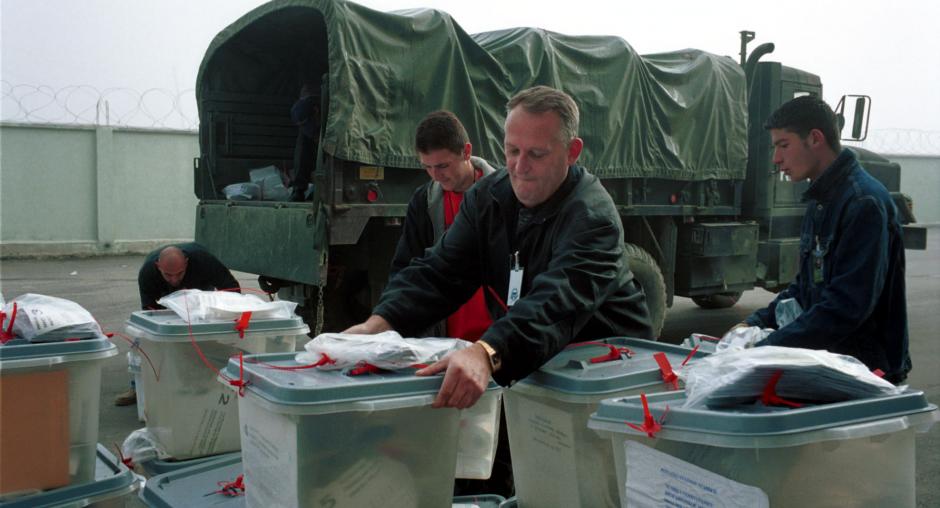Newsroom
Ballots for municipal elections arrive today in Kosovo
PRISTINA 15 October 2002

Ballots from last year's Kosovo Assembly elections being unloaded at the OSCE Counting and Results Centre in Obiliq/Obilic, November 2001. (Lubomir Kotek/OSCE) Photo details
PRISTINA, 15 October 2002 - Over two million ballots arrive today in Kosovo for the 26 October Municipal Elections.
The ballots, which were printed in the United Kingdom, are being brought to Kosovo on an aircraft chartered by the printer. They will be taken under close security, provided by KFOR, from Pristina airport to the OSCE Counting and Result Centre near Fushe Kosove / Kosovo Polje.
Ballots will be stored, under KFOR and OSCE protection, at the Counting and Result Centre until 20 October. Those used for in-Kosovo voting will then be transferred in KFOR trucks to different OSCE facilities in the field which will be guarded by OSCE security staff and, when needed, by UNMIK police and KFOR. On the morning of the election day they will be distributed to international polling station supervisors who will be escorted to polling centres by the police.
Ballots used in Serbia and Montenegro voting will be transferred on OSCE trucks to seven delivery locations on 21 October. They will be escorted to the administrative boundary by UNMIK Police. From the boundary, local police will take over the escorts to the OSCE field offices. They will also be distributed to international polling station supervisors on the morning of the election day.
Comprehensive procedures are being put in place to ensure secure and secret voting. The ballots have been printed by a company that has previously provided ballots for elections in Kosovo and a number of other internationally organized elections. The ballots contain a number of high-tech security features to safeguard against fraud.
The production of the ballots has been financed by a contribution of 300,000 euros from the Danish Government.
A number of ballots were brought to Kosovo ahead of today's shipment to allow the special needs voting programme to get underway; this allows people who are unable to vote on election day - including homebound people, Kosovo Police Service officers, those in hospital and those in prison - to cast a ballot. The programme has been running since 7 October. Ballots have also already been sent to those who can vote by mail.
The ballots, which were printed in the United Kingdom, are being brought to Kosovo on an aircraft chartered by the printer. They will be taken under close security, provided by KFOR, from Pristina airport to the OSCE Counting and Result Centre near Fushe Kosove / Kosovo Polje.
Ballots will be stored, under KFOR and OSCE protection, at the Counting and Result Centre until 20 October. Those used for in-Kosovo voting will then be transferred in KFOR trucks to different OSCE facilities in the field which will be guarded by OSCE security staff and, when needed, by UNMIK police and KFOR. On the morning of the election day they will be distributed to international polling station supervisors who will be escorted to polling centres by the police.
Ballots used in Serbia and Montenegro voting will be transferred on OSCE trucks to seven delivery locations on 21 October. They will be escorted to the administrative boundary by UNMIK Police. From the boundary, local police will take over the escorts to the OSCE field offices. They will also be distributed to international polling station supervisors on the morning of the election day.
Comprehensive procedures are being put in place to ensure secure and secret voting. The ballots have been printed by a company that has previously provided ballots for elections in Kosovo and a number of other internationally organized elections. The ballots contain a number of high-tech security features to safeguard against fraud.
The production of the ballots has been financed by a contribution of 300,000 euros from the Danish Government.
A number of ballots were brought to Kosovo ahead of today's shipment to allow the special needs voting programme to get underway; this allows people who are unable to vote on election day - including homebound people, Kosovo Police Service officers, those in hospital and those in prison - to cast a ballot. The programme has been running since 7 October. Ballots have also already been sent to those who can vote by mail.
